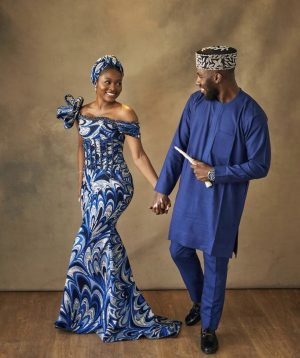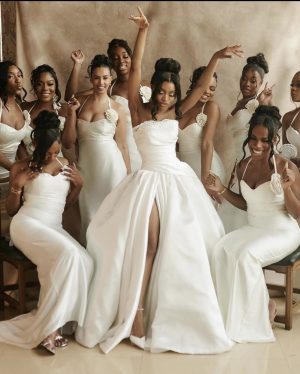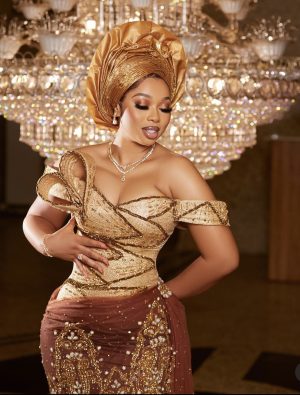From same Cloth Fabric to Squad Goals, let us take a look at why Nigerian weddings are truly the Festivity of every season.
By Tme Lux Weddings | Published 6 February 2024
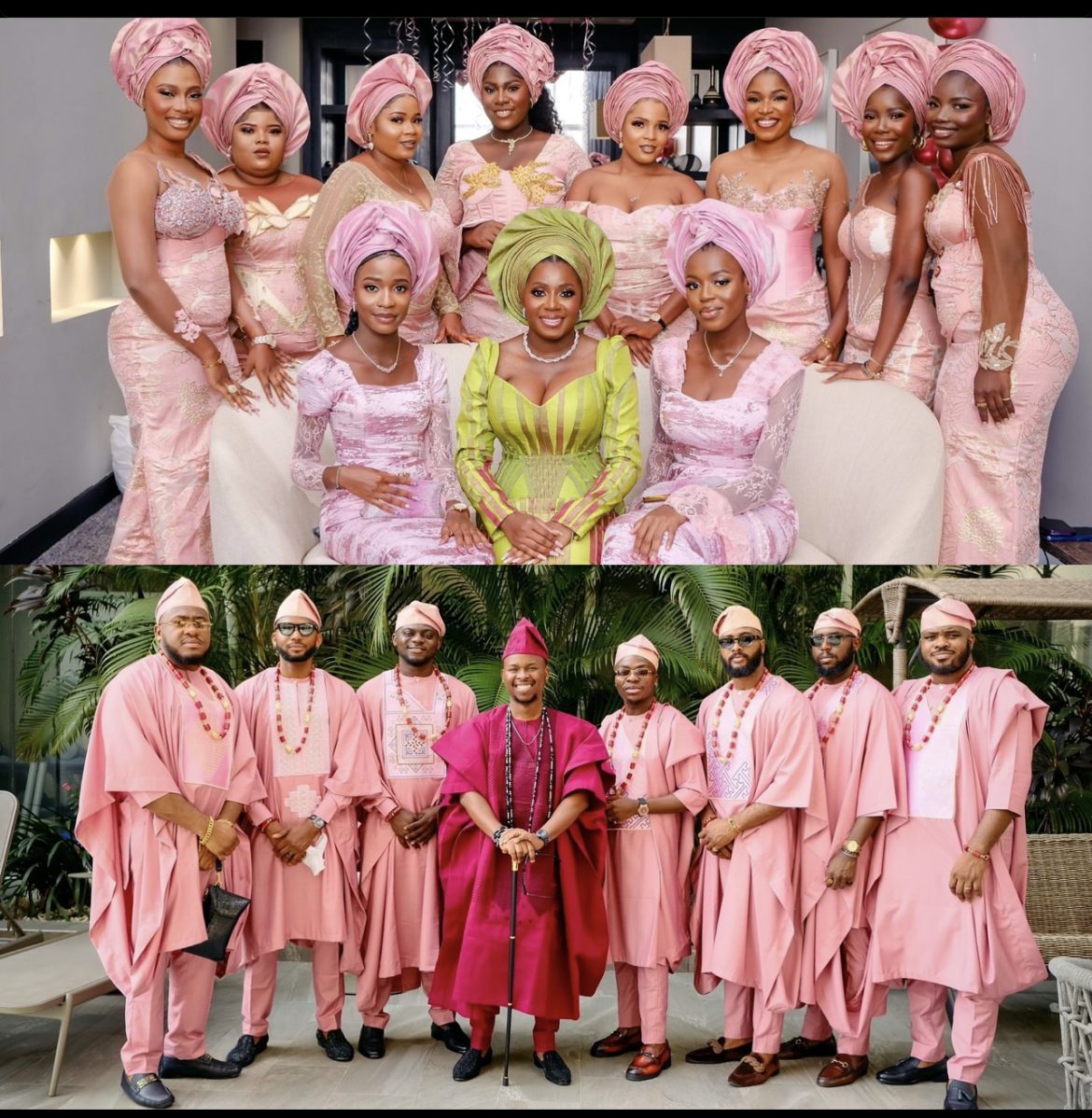
Nigerian weddings are renowned for their vibrant colors, rich traditions, and cultural diversity. Among the myriad of elements that contribute to the splendor of these celebrations, Aso-Ebi holds a special place. Aso-Ebi, which translates to “family cloth” in Yoruba, is not just a fabric; it’s a symbol of unity, tradition, and a visual feast that adds an extraordinary dimension to the Nigerian weddings.
Aso-Ebi: A Cultural Emblem
The concept of Aso-Ebi is deeply rooted in Nigerian culture. It is a practice where family members, friends, and even well-wishers wear coordinating fabrics as a sign of solidarity with the couple. This communal dressing tradition embodies the spirit of togetherness and creates a sense of belonging, transforming the wedding venue into a Rainbow of colors.
Tradition: Significance and Symbolism
Historically, Aso-Ebi was worn to identify members of the same group or family during special occasions. In the context of weddings, it serves as a visual representation of the bride and groom’s support system. The carefully chosen fabric is a unifying symbol, expressing shared joy, love, and collective participation in the joyous union. This tradition not only strengthens familial bonds but also fosters a sense of community.
Beyond its role as a symbol of unity, Aso-Ebi holds cultural significance. The fabrics often feature intricate patterns and motifs that carry cultural meanings. From geometric designs to traditional symbols, each fabric tells a story that is deeply rooted in the heritage of the wearers.
The Evolution of Aso-Ebi: Embracing Trends
While Aso-Ebi remains firmly grounded in tradition, it has also evolved over the years, reflecting changing fashion trends and individual creativity. Today, Aso-Ebi is not just about wearing coordinating fabrics; it’s about making a fashion statement. Brides and grooms now carefully select fabrics that align with their wedding themes, and the Aso-Ebi styles are curated to reflect modern fashion sensibilities.
The evolution of Aso-Ebi has also embraced inclusivity. It is no longer limited to family members; friends, colleagues, and even acquaintances are invited to participate. This inclusiveness extends the sense of community beyond blood ties, turning weddings into grand celebrations that involve a broader social circle.
Choosing Aso-Ebi Fabrics: The Ritual of Selection
The process of selecting Aso-Ebi fabrics is a significant aspect of Nigerian wedding preparations. The couple, often in consultation with close family members, chooses fabrics that align with the wedding color scheme and theme. These fabrics are then distributed to invited guests, who willingly embrace the tradition by having outfits tailored to their individual preferences.
The selection of Aso-Ebi fabrics is not just a practical consideration; it is a ritual that involves careful thought and consideration. Couples often choose fabrics that hold personal or cultural significance, ensuring that the Aso-Ebi ensemble becomes a cherished memento of the wedding day.
Related: Tips to Choosing your Wedding Colors
Aso-Ebi Styles: Celebrating Creativity
The beauty of Aso-Ebi lies not just in the fabric but in the diverse styles that emerge from it. Tailors and fashion designers play a crucial role in translating the chosen fabric into stunning outfits that cater to the tastes and preferences of the wearers.
From traditional gowns to contemporary dresses, Aso-Ebi styles showcase the creativity and diversity within Nigerian fashion. Women may opt for elaborate head wraps, gele, or elegant turbans, while men can choose between classic agbada, modern suits, or traditional fila. The result is a visual symphony of colors and styles that adds a layer of sophistication and glamour to the wedding celebration.
The Economic Impact of Aso-Ebi: Empowering Local Industries
Aso-Ebi doesn’t just contribute to the visual spectacle of Nigerian weddings; it also plays a vital role in supporting local industries. The demand for Aso-Ebi fabrics fuels the textile and fashion sectors, providing employment opportunities for artisans, weavers, and tailors. The economic impact extends beyond the wedding day, creating a sustainable ecosystem that benefits communities involved in the production of Aso-Ebi materials.
Challenges and Controversies: Balancing Tradition and Inclusivity
While Aso-Ebi is a beloved tradition, it is not without its challenges. One of the ongoing debates revolves around the potential exclusivity and financial strain it may place on wedding guests. The expectation to purchase a specific fabric and have an outfit tailored can become a financial burden for some attendees. In response to this, there is a growing trend of couples being considerate of their guests’ financial capacities, allowing more flexibility in Aso-Ebi participation.
Another challenge is the potential for Aso-Ebi to overshadow individuality. Some argue that the pressure to conform to a chosen fabric and style may stifle personal expression. To address this, couples are increasingly encouraging creativity within the chosen theme, allowing guests to infuse their unique styles and preferences into their Aso-Ebi outfits.
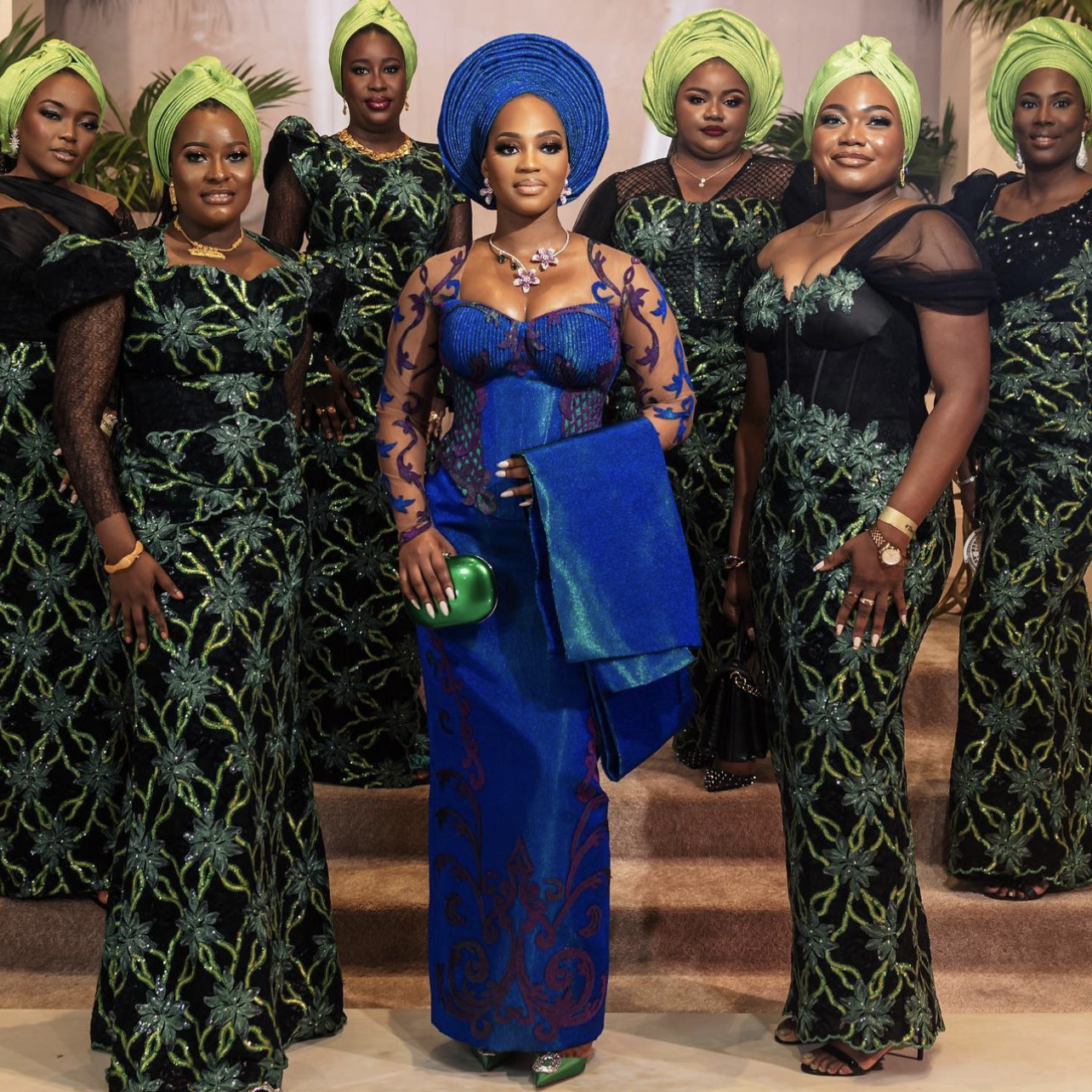
Navigating Aso-Ebi Etiquette: Guidelines for Couples and Guests
To ensure that Aso-Ebi enhances the wedding experience rather than causing discomfort, couples can consider the following etiquette guidelines:
1. Financial Consideration:
Couples should be mindful of guests’ financial capacities when choosing Aso-Ebi fabrics. Offering more affordable options or allowing flexibility in fabric choice promotes inclusivity.
2. Creativity and Individuality:
Encourage creativity within the chosen Aso-Ebi theme. Guests should feel empowered to express their individual styles and preferences while adhering to the overall color scheme.
3. Communication:
Clear communication is crucial. Couples should provide ample information about the chosen Aso-Ebi fabric, including where to purchase it, recommended tailors, and any specific style preferences.
4. Flexibility:
Recognize that not everyone may be able to participate in Aso-Ebi. Couples can convey that participation is optional, and guests can attend the wedding in outfits that align with the chosen color scheme.
5. Considerate Planning:
Couples should plan well in advance and consider the availability of the chosen Aso-Ebi fabric. This allows guests ample time to make arrangements and avoids last-minute stress.
Conclusion: Aso-Ebi as a Living Tradition
In the intricate embroidery of Nigerian weddings, Aso-Ebi is not just a fabric; it is a living tradition that binds families, friends, and communities together. It embodies the essence of unity, celebrates cultural heritage, and adds a spectacular visual dimension to the festivities. As Aso-Ebi continues to evolve, striking a delicate balance between tradition and inclusivity, it remains a cherished element that contributes to the unique and joyous spirit of Nigerian weddings. In its vibrant hues and diverse styles, Aso-Ebi stands as a testament to the resilience of cultural traditions in the ever-changing landscape of modern celebrations.
With that been said, let us now look at how close friends, family members, siblings and other supporters of the couple wear their own Aso-ebi, to accompany the bride and groom through out the day, as they come out in various dance displays, intricate fashionable Aso- ebi outfits, social media transition videos, phots & Hashtags to show their support to the couple.
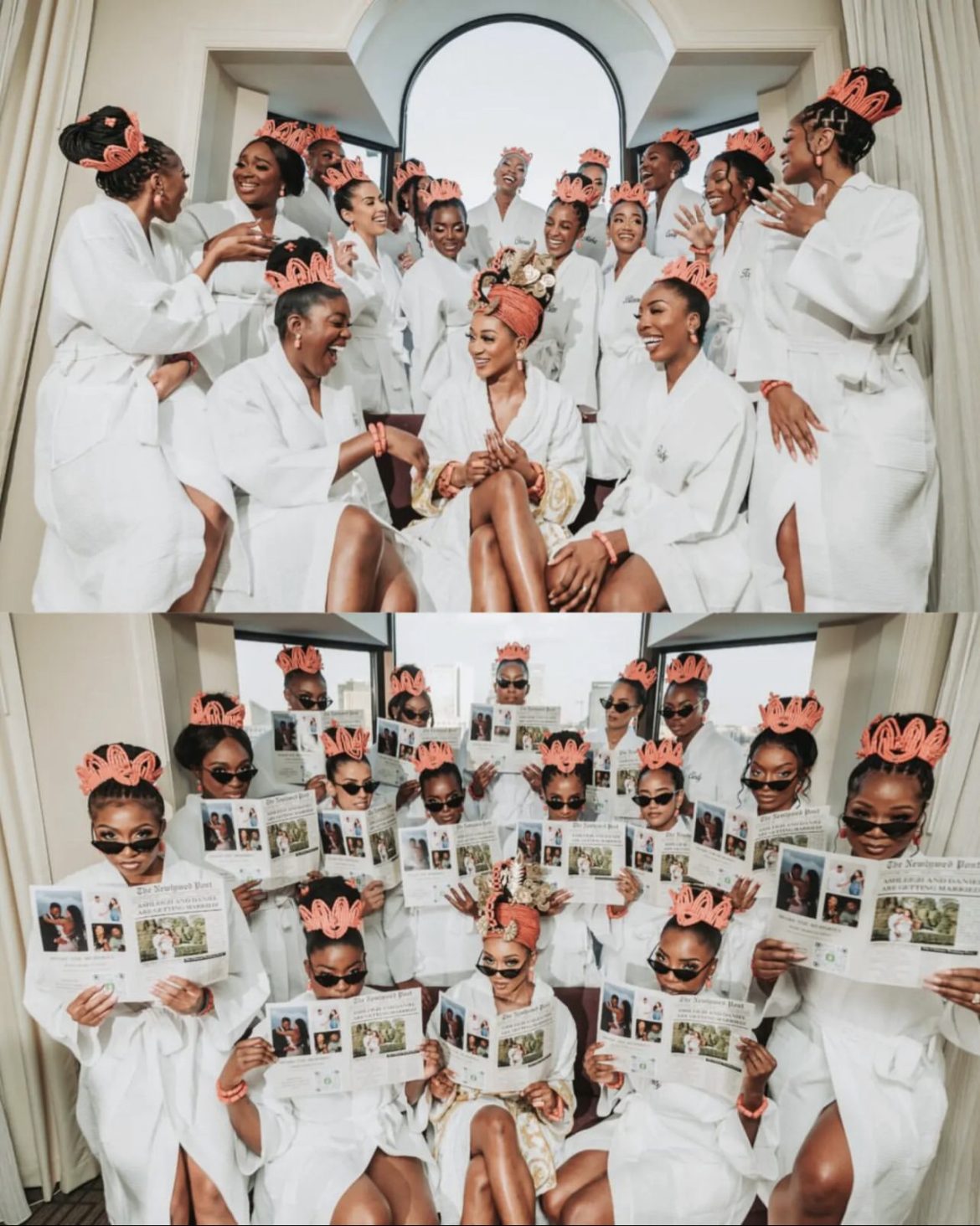
Squad Goals: Breathtaking Aso-ebi Moments in Nigerian Weddings
Nigerian weddings are not just celebrations of love between couples; they are also vibrant showcases of unity, joy, and style with bridesmaids playing a pivotal role in enhancing the overall visual splendor. In this exploration of “Squad Goals,” we dive into the breathtaking moments created by bridesmaids. & groomsmen in Nigerian weddings, capturing the essence of camaraderie, culture, and contemporary flair.
1.Color Coordination Brilliance:
Naija bridesmaids are masterful in the art of color coordination. Whether it’s a uniform aso-ebi fabric or a carefully curated palette, bridesmaids effortlessly enhance the visual harmony of the wedding, creating stunning group aesthetics.
2.Traditional Attire Glamour:
Bridesmaids showcase the richness of Nigerian cultural diversity through their traditional attire. From the resplendent gele to the intricately beaded blouses and wrappers, each bridesmaid becomes a cultural ambassador, adding an extra layer of elegance to the celebration.
3. Contemporary Twist to Traditional Styles:
While embracing tradition, Nigerian bridesmaids often infuse contemporary twists into their styles. Modern cuts, innovative draping techniques, and creative accessories contribute to a fashion-forward ensemble that complements the overall wedding theme.
4. Bridal Train Choreography: A Dance Spectacle:
Naija bridesmaids are known for their energetic dance performances. Choreographed bridal train dances are a common sight, infusing the celebration with a burst of joy and creating unforgettable moments that resonate with the rhythm of the wedding festivities.
5. Statement Gele and Headpieces:
The gele, a traditional headwrap, becomes a statement accessory for bridesmaids. Whether they opt for bold and vibrant gele styles or elegantly adorned headpieces, bridesmaids elevate their looks, adding a touch of regality to the wedding ensemble.
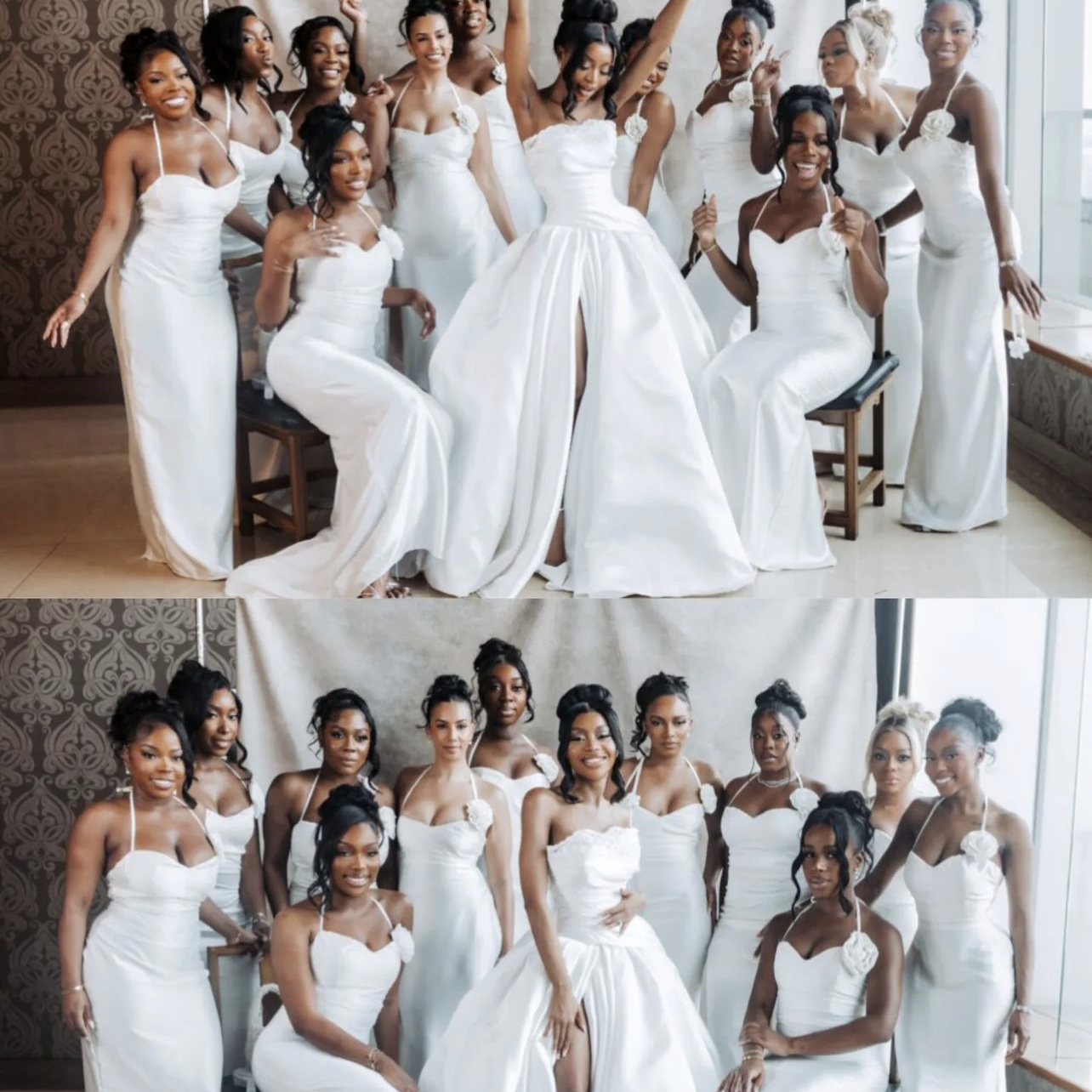
6. Bouquets and Floral Arrangements:
Bridesmaids often carry bouquets or floral arrangements that complement the wedding theme. These floral accents add a touch of freshness and sophistication to the bridal party, creating charming moments that are beautifully captured in photos.
7. Unity in Diversity:
Nigerian weddings celebrate diversity, and bridesmaids often represent a beautiful spectrum of friendship, ethnicity, and backgrounds. The unity in this diversity is not only visually striking but also a powerful symbol of love and companionship.
Related : tips to giving your wedding the perfect luxury design
8. Individualized Styling:
While maintaining a cohesive look, bridesmaids in Nigerian weddings often showcase individualized styling. From unique accessories to personalized hairstyles, each bridesmaid contributes to the collective aesthetic while expressing her own distinct personality.
9. Supportive Sisterhood Moments:
Beyond the visual allure, bridesmaids play a crucial role in supporting the bride emotionally. Heartfelt moments, from sharing laughter to offering comforting words, create an atmosphere of sisterhood that enhances the emotional resonance of the wedding day.
10. Captivating Entrance and Procession:
Bridesmaids make captivating entrances and processions, setting the tone for the bride’s arrival. Their synchronized movements, paired with the rhythm of traditional music or contemporary beats, create an atmospheric build-up that adds to the anticipation and excitement of the ceremony.
In conclusion, Naija bridesmaids elevate the concept of “Squad Goals” to new heights. They are not just supporting characters; they are integral contributors to the visual and emotional narrative of a Nigerian wedding. With their breathtaking moments, bridesmaids add a layer of grace, cultural richness, and contemporary flair that transforms the celebration into a memorable spectacle. These moments of sisterhood and style embody the essence of Squad Goals in the context of Nigerian weddings, where unity and elegance go hand in hand.
Want to Plan the Perfect Nigerian Wedding? CLICK HERE
2 Reviews
modi iste fuga quidem amet consectetur nam repellat ullam incidunt quisquam atque non quia recusandae consectetur. provident et est rerum asperiores illo quo voluptatem eos reprehenderit totam molesti
doloribus consequatur aut dolores quo consectetur eum expedita nihil error voluptatem in in quis. quia dicta molestias dolore rerum nihil eum cumque dolorem non iure soluta. voluptatem pariatur eius m


